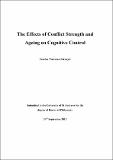Files in this item
The effects of conflict strength and ageing on cognitive control
Item metadata
| dc.contributor.advisor | Jentzsch, Ines | |
| dc.contributor.author | Strozyk, Jessica Vanessa | |
| dc.date.accessioned | 2013-05-23T19:16:55Z | |
| dc.date.available | 2013-05-23T19:16:55Z | |
| dc.date.issued | 2013-06 | |
| dc.identifier | uk.bl.ethos.572719 | |
| dc.identifier.uri | https://hdl.handle.net/10023/3549 | |
| dc.description | Electronic version excludes material for which permission has not been granted by the rights holder | en |
| dc.description.abstract | In this thesis, I investigated effects of conflict strength and ageing on cognitive control. Conflict strength was manipulated in the Eriksen flanker task using two different approaches: 1. independent variation of flanker and target contrast; 2. manipulation of stimulus onset asynchrony (SOA). Reducing flanker contrast relative to target contrast decreased conflict strength, as shown by a reduction in compatibility effects, when contrast conditions were presented in a randomized fashion but not when they were presented block-wise. An SOA of 100 ms did lead to increased compatibility effects compared to SOAs of 0 ms and 200 ms. Effects of conflict appear to be reflected in the N2 component of the ERP. Although priming played a crucial role in the emergence of the sequential adjustment effect, conflict strength also influenced this effect to a certain degree, supporting the claim that sequential adjustments represent an adaptation of cognitive control. Post-error slowing and error-related ERP components, on the other hand, were not affected by the conflict manipulations, suggesting that errors cannot be explained in terms of conflict processing. Effects of ageing on cognitive control were investigated in a group of middle-aged participants. Although physiological indicators of conflict and error processing were compromised in this age group and overall response times were increased, compatibility, sequential adjustment, and post-error slowing effects were of comparable size as in young adults. These findings suggest that participants could successfully compensate for age-related physiological changes at this early stage of ageing. In conclusion, the research presented in this thesis provided important information to extend our knowledge of factors influencing cognitive control processes. | en_US |
| dc.language.iso | en | en_US |
| dc.publisher | University of St Andrews | |
| dc.rights | Creative Commons Attribution-NonCommercial-NoDerivs 3.0 Unported | |
| dc.rights.uri | http://creativecommons.org/licenses/by-nc-nd/3.0/ | |
| dc.subject | Cognitive control | en_US |
| dc.subject | Ageing | en_US |
| dc.subject | Conflict strength | en_US |
| dc.subject.lcc | BF724.55C63S8 | |
| dc.subject.lcsh | Cognition--Age factors | en_US |
| dc.subject.lcsh | Cognition--Physiological aspects | en_US |
| dc.subject.lcsh | Cognitive consistency | en_US |
| dc.title | The effects of conflict strength and ageing on cognitive control | en_US |
| dc.type | Thesis | en_US |
| dc.type.qualificationlevel | Doctoral | en_US |
| dc.type.qualificationname | PhD Doctor of Philosophy | en_US |
| dc.publisher.institution | The University of St Andrews | en_US |
This item appears in the following Collection(s)
Except where otherwise noted within the work, this item's licence for re-use is described as Creative Commons Attribution-NonCommercial-NoDerivs 3.0 Unported
Items in the St Andrews Research Repository are protected by copyright, with all rights reserved, unless otherwise indicated.


